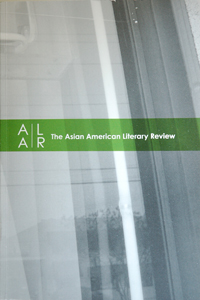
It’s always exciting to receive a fat jiffy envelope with a book-like bulge in it when the mail comes. So when my copy of The Asian American Literary Review‘s inaugural issue arrived last month, I was especially ecstatic to rip into the envelope. Since the editors of AALR announced their presence online earlier this year, I had been eagerly anticipating their first issue. Their pre-release publicity had advertised an impressive lineup of literary luminaries, and I must say that in every respect, the issue has managed to live up to the editors’ promises.
I’m going to focus on some of the poetry in the issue in a bit (since this is, after all, a poetry blog), but before I delve into that train of thought, I should note that I immensely enjoyed the prose in the issue, too. I especially liked that the editors chose to began the issue with a “forum” (i.e. a series of position statements and replies) in which three Asian American writers (Alexander Chee, David Mura, Ru Freeman) responded to questions regarding the necessity and purpose of an Asian American literary magazine. I enjoyed following the convergence and divergence of the participant’s different points of view, and in particular, thought that their discussion about whether an Asian American writer must necessarily write ‘about’ his or her ethnicity brought up some very important questions, such as: do MFA programs disservice students of color by teaching them to write toward a “norm” set by mostly middle-class, white models? Or, conversely, do they force students of color to conform their work to an particular “trope” or mode in which “ethnic writing” is expected to operate? I also enjoyed the dialogue sparked by David Mura’s observations about the lack of longevity that has hitherto plagued many Asian American literary ventures. Mura noted two problems that have contributed to this trend: 1) a lack of financial and administrative know-how, and 2) the divided nature of the Asian American community with regards to whether or not to claim a pan-Asian American identity. I thought that Mura’s observations were spot-on. Young as LR is, my work on it thus far has already given me a taste of some of the challenges that he identifies. I was especially struck by his point about lack of administrative manpower. Administratively, LR is a two-woman operation and our solution thus far to keeping the administrative side of things manageable has been to keep the magazine relatively small. But what of the future? What will happen if LR expands beyond our administrative capacities? Mura’s observations (and the ensuing responses by Chee and Freeman) touched on a very real concern for us, and served as a good reminder that in order to avoid burnout, we will need to be humble enough to seek out help when it’s necessary while remaining practical enough to stay grounded in whatever way we can.
Continue reading “Friends & Neighbors: Issue 1 of THE ASIAN AMERICAN LITERARY REVIEW”